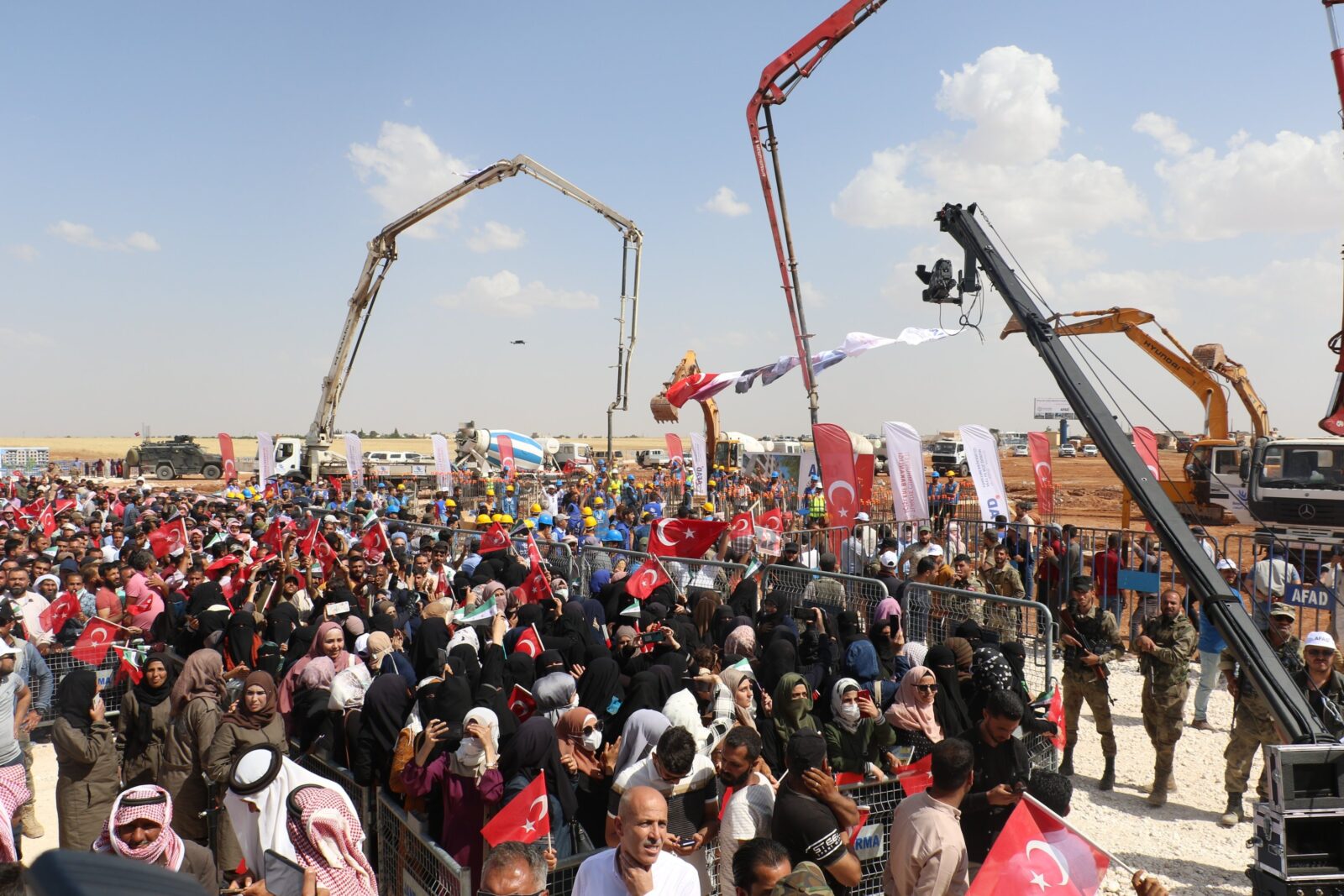Over the last decade, the Syrian Civil War has displaced over half of Syria’s population, with more than 3.5 million people seeking refuge in the neighboring country of Turkey. Turkey has taken in more Syrian refugees than any other country, which has been met with apprehension from Turkish citizens.
In May 2023, Turkey began a large-scale humanitarian project in the Idlib and Aleppo governorates of Syria pledging the construction of about a quarter million housing units, commercial facilities, industrial areas, farming plots, schools and hospitals, spearheaded by President Recep Erdoğan and supported by the Qatar Fund for Development. The housing project pushed refugees displaced into Turkey to begin relocating back to their motherland, specifically to the 30km swathe of land along the northern Syrian–Turkish border created by Turkey to function as a demilitarized area known as the “safe zone.” The target amount of 240,000 permanent housing units is set to be finished by 2025, with 1 million refugees expected to be repatriated into Syria. In addition to this new program, Turkey has already built 75,000 25-square-meter briquette homes in Idlib and 107,000 in Aleppo within the past two years, housing over 6 million Syrians.
The new project is operating under the slogan “safe, voluntary and [honorable]returns,” and is most likely a result of the “temporary protected” status for Syrians which grants refuge that is temporary and thus volatile. According to Turkish Interior Minister Suleyman Soylu, “there is a serious demand for a voluntary and dignified return to this safe area.”
While Soylu has labeled this repatriation scheme “the most honorable project the human history will talk about” and “an exemplary step for the whole world, showing how humanitarian aid transforms into development in a region,” many have been skeptical of Turkey’s true intentions.
The validity of this “serious demand” expressed by Soylu has been contested by a myriad of international sources including the UNHCR, Amnesty International and Human Rights Watch (HRW). The UNHCR reported in 2023 that although over half of Syrian refugees hope to return one day, a mere 1.1% planned to do so within the next year.
In 2019, the Turkish government began forcibly deporting refugees back to Idlib, an area marred with violence. Police scoured public areas and raided apartments, searching for Syrians with and without temporary protection cards. While Turkey insisted its actions were legal, Turkish and international law — under the principle of non-refoulement — prohibit forced deportation to active war zones under any circumstances “irrespective of migration status.”
While in custody, Turkish officials coerced detained Syrian refugees to sign statements expressing their desire to repatriate, under the threat of imprisonment. If able to re-enter Turkey, deported refugees who did have Turkish identification documents found their validity had been canceled. Whether or not the zone is actually safe is also a matter of contention, with major international organizations including HRW condemning the Turkish safe zone as “anything but,” describing it as “woefully misguided,” “dangerous” and “bound to fail.”
Many are concerned that the safe zone simply is not safe, as it is rife with violence. With 12,000 ISIS fighters imprisoned in the safe zone’s easternmost governorate of Al-Hasakah, the area is a prime target for rebel groups and armed uprisings — such as the 2022 ISIS prison break, the “most significant” assault since its inception.
Additionally, safe zones as a concept have been notoriously counterintuitive. According to HRW, militants are known to take advantage of safe zones, intermingling with civilians to attempt to avoid retaliation, turning the area into a “valid military target.” Additionally, safe zones are lucrative sources of humanitarian aid, which combatants can easily steal. They also serve as ripe recruiting grounds for extremist organizations.
President Erdoğan is managing a two-level political game, juggling both domestic and international concerns. Regardless of these criticisms, free housing and resources are not entirely negative endeavors. Erdoğan is incentivizing Syrians to act in a way beneficial to their long-term development — taking advantage of resources that will ultimately lead to a sense of stability and safety —– and furthering his domestic and international agendas.
Regarding Turkish domestic politics, Erdoğan established this plan in the midst of the country’s 2023 presidential elections. His opponent Kemal Kilicdaroglu campaigned on a platform of sending “all the refugees home,” reflecting popular anti-refugee sentiment, so a similar message was necessary on Erdoğan’s behalf if he wanted to compete with Kilicdaroglu. Instead of publicly forcing refugees to return home, he attempted to bolster both his domestic image as a stern advocate for Turkish nationalism and international image as a humanitarian by proposing the free housing solution instead.
In addition to improving his international reputation, his building schemes solidified the establishment of the “safe zone,” as Turkish building projects bolster Turkish influence in the region. This move also supports Turkish imperial interests and the rise in pan-Turkism, a growing nationalist ideology that “emphasizes the common ethnic, cultural, and linguistic roots of Turkic peoples living across Eurasia,” regardless of Turkish nationality.
Before the inception of the new project, the Syrian government issued a statement in 2022 “[rejecting]these plans” and labeling them as “criminal projects.” Although the Syrian government is viewed as highly corrupt and not necessarily concerned with the best interests of the Syrian people, it is worth noting their stern opposition to the plan. Echoing concerns from the international community, Syria declared, in relation to the housing project, that “the main objective is colonialism.” Considering that Turkey has maintained a violent occupation of northern Syria since 2016, fears of continued land-grabs are not unfounded.
Whether or not Syrians would repatriate into Syria without the force of the Turkish government or the incentive of free housing is unclear, but it is safe to say that the temporary safe place provides respite for the refugees, especially since the Syrian war persists, with rebel group strongholds as prevalent as ever. Thus, while the housing project is a potential positive step in Syrian repatriation, it is not unreasonable to scrutinize Turkey’s questionable underlying motives and reexamine the actual benefits of safe zones.







